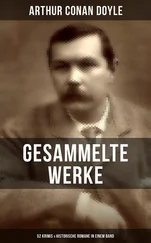For he can do no more than Caesar’s arm
When Caesar’s head is off.
CASSIUS.
Yet I do fear him;
For in th’ ingrafted love he bears to Caesar—
BRUTUS.
Alas, good Cassius, do not think of him:
If he love Caesar, all that he can do
Is to himself,—take thought and die for Caesar.
And that were much he should; for he is given
To sports, to wildness, and much company.
TREBONIUS.
There is no fear in him; let him not die;
For he will live, and laugh at this hereafter.
[Clock strikes.]
BRUTUS.
Peace! count the clock.
CASSIUS.
The clock hath stricken three.
TREBONIUS.
‘Tis time to part.
CASSIUS.
But it is doubtful yet
Whether Caesar will come forth today or no;
For he is superstitious grown of late,
Quite from the main opinion he held once
Of fantasy, of dreams, and ceremonies.
It may be these apparent prodigies,
The unaccustom’d terror of this night,
And the persuasion of his augurers
May hold him from the Capitol to-day.
DECIUS.
Never fear that: if he be so resolved,
I can o’ersway him, for he loves to hear
That unicorns may be betray’d with trees,
And bears with glasses, elephants with holes,
Lions with toils, and men with flatterers:
But when I tell him he hates flatterers,
He says he does, being then most flattered.
Let me work;
For I can give his humor the true bent,
And I will bring him to the Capitol.
CASSIUS.
Nay, we will all of us be there to fetch him.
BRUTUS.
By the eighth hour: is that the uttermost?
CINNA.
Be that the uttermost; and fail not then.
METELLUS.
Caius Ligarius doth bear Caesar hard,
Who rated him for speaking well of Pompey:
I wonder none of you have thought of him.
BRUTUS.
Now, good Metellus, go along by him:
He loves me well, and I have given him reason;
Send him but hither, and I’ll fashion him.
CASSIUS.
The morning comes upon ‘s. We’ll leave you, Brutus;—
And, friends, disperse yourselves, but all remember
What you have said, and show yourselves true Romans.
BRUTUS.
Good gentlemen, look fresh and merrily;
Let not our looks put on our purposes,
But bear it as our Roman actors do,
With untired spirits and formal constancy:
And so, good morrow to you every one.—
[Exeunt all but Brutus.]
Boy! Lucius!—Fast asleep? It is no matter;
Enjoy the honey-heavy dew of slumber:
Thou hast no figures nor no fantasies,
Which busy care draws in the brains of men;
Therefore thou sleep’st so sound.
[Enter Portia.]
PORTIA.
Brutus, my lord!
BRUTUS.
Portia, what mean you? wherefore rise you now?
It is not for your health thus to commit
Your weak condition to the raw-cold morning.
PORTIA.
Nor for yours neither. You’ve ungently, Brutus,
Stole from my bed: and yesternight, at supper,
You suddenly arose, and walk’d about,
Musing and sighing, with your arms across;
And, when I ask’d you what the matter was,
You stared upon me with ungentle looks:
I urged you further; then you scratch’d your head,
And too impatiently stamp’d with your foot:
Yet I insisted, yet you answer’d not;
But, with an angry wafture of your hand,
Gave sign for me to leave you. So I did;
Fearing to strengthen that impatience
Which seem’d too much enkindled; and withal
Hoping it was but an effect of humour,
Which sometime hath his hour with every man.
It will not let you eat, nor talk, nor sleep;
And, could it work so much upon your shape
As it hath much prevail’d on your condition,
I should not know you, Brutus. Dear my lord,
Make me acquainted with your cause of grief.
BRUTUS.
I am not well in health, and that is all.
PORTIA.
Brutus is wise, and, were he not in health,
He would embrace the means to come by it.
BRUTUS.
Why, so I do. Good Portia, go to bed.
PORTIA.
Is Brutus sick? and is it physical
To walk unbraced and suck up the humours
Of the dank morning? What, is Brutus sick,
And will he steal out of his wholesome bed
To dare the vile contagion of the night,
And tempt the rheumy and unpurged air
To add unto his sickness? No, my Brutus;
You have some sick offense within your mind,
Which, by the right and virtue of my place,
I ought to know of: and, upon my knees,
I charge you, by my once commended beauty,
By all your vows of love, and that great vow
Which did incorporate and make us one,
That you unfold to me, yourself, your half,
Why you are heavy, and what men tonight
Have had resort to you; for here have been
Some six or seven, who did hide their faces
Even from darkness.
BRUTUS.
Kneel not, gentle Portia.
PORTIA.
I should not need, if you were gentle Brutus.
Within the bond of marriage, tell me, Brutus,
Is it excepted I should know no secrets
That appertain to you? Am I yourself
But, as it were, in sort or limitation,—
To keep with you at meals, comfort your bed,
And talk to you sometimes? Dwell I but in the suburbs
Of your good pleasure? If it be no more,
Portia is Brutus’ harlot, not his wife.
BRUTUS.
You are my true and honorable wife;
As dear to me as are the ruddy drops
That visit my sad heart.
PORTIA.
If this were true, then should I know this secret.
I grant I am a woman; but withal
A woman that Lord Brutus took to wife:
I grant I am a woman; but withal
A woman well reputed, Cato’s daughter.
Think you I am no stronger than my sex,
Being so father’d and so husbanded?
Tell me your counsels, I will not disclose ‘em.
I have made strong proof of my constancy,
Giving myself a voluntary wound
Here in the thigh: can I bear that with patience
And not my husband’s secrets?
BRUTUS.
O ye gods,
Render me worthy of this noble wife!
[Knocking within.]
Hark, hark, one knocks: Portia, go in awhile;
And by and by thy bosom shall partake
The secrets of my heart:
All my engagements I will construe to thee,
All the charactery of my sad brows.
Leave me with haste.
[Exit Portia.]
—Lucius, who’s that knocks?
[Re-enter Lucius with Ligarius.]
LUCIUS.
Here is a sick man that would speak with you.
BRUTUS.
Caius Ligarius, that Metellus spake of.—
Boy, stand aside.—Caius Ligarius,—how?
LIGARIUS.
Vouchsafe good-morrow from a feeble tongue.
BRUTUS.
O, what a time have you chose out, brave Caius,
To wear a kerchief! Would you were not sick!
LIGARIUS.
I am not sick, if Brutus have in hand
Any exploit worthy the name of honour.
BRUTUS.
Such an exploit have I in hand, Ligarius,
Had you a healthful ear to hear of it.
LIGARIUS.
By all the gods that Romans bow before,
I here discard my sickness. Soul of Rome!
Brave son, derived from honorable loins!
Thou, like an exorcist, hast conjured up
My mortified spirit. Now bid me run,
And I will strive with things impossible;
Yea, get the better of them. What’s to do?
BRUTUS.
A piece of work that will make sick men whole.
LIGARIUS.
But are not some whole that we must make sick?
BRUTUS.
That must we also. What it is, my Caius,
I shall unfold to thee, as we are going,
To whom it must be done.
LIGARIUS.
Set on your foot;
Читать дальше












